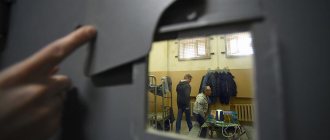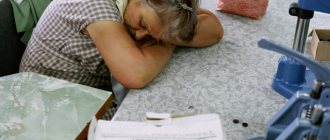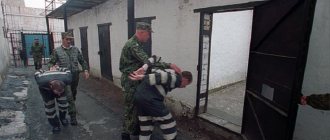Due to the coronavirus epidemic, Russians faced numerous restrictions and were forced to change their usual way of life. The convicts find themselves in the most difficult situation: they are already limited in many ways, and now they are left without meetings with loved ones and without parcels. But the most severe restrictions have been introduced in the Moscow pre-trial detention center: the isolation wards have been transferred to barracks mode, and even investigators and lawyers have been denied access there. Lenta.ru, on condition of anonymity, talked with the prisoners and found out how the coronavirus pandemic has changed life behind bars.
On March 16, the Federal Penitentiary Service (FSIN) of Russia published an announcement on its website that all visits were suspended in places of deprivation of liberty.
On March 30, all Moscow pre-trial detention centers were transferred to the so-called barracks regime. This means that employees join and remain at work for 14 days. From that moment on, the detention centers stopped accepting any deliveries for prisoners.
On March 31, Moscow pre-trial detention centers suspended the admission of new prisoners - all newcomers were taken to one pre-trial detention center No. 7 in Kapotnya. In addition, the admission of investigators and lawyers to detention centers has been stopped; prisoners were no longer taken to investigative actions and court hearings.
“I don’t know what will happen without drugs”
Mikhail, pre-trial detention center No. 5 “Vodnik” (Moscow):
— Personally, I have mixed feelings about quarantine. The fact is that since March 18, judges have been trying to postpone hearings not related to the extension of arrest until the second half of April. This means that you are not transported in a stuffy paddy wagon all over Moscow with others.
In our country, everything is structured in such a way that early in the morning, at about seven o’clock, you are taken from the pre-trial detention center, then the paddy wagon drives around the detention centers, collecting everyone who has a hearing in the same court as you.
Then you are driven into a cramped guard room, and there you wait for the trial to begin. It is impossible to eat or drink
So, this is the second week in my life that this has not happened, which I am very happy about. I more or less slept, ate, and generally somehow felt that there was something else in life besides traffic jams, the smell of gasoline and sweaty fellow sufferers; I finally felt like a human being.
Photo: Yuri Martyanov / Kommersant
I watched TV for several days; we have it in our cell. What’s interesting is that when I was free, I rarely watched it, but here I got hooked on all sorts of TV series that are constantly shown there. With their help, you somehow distract yourself from endless thoughts about your business.
The bad news for me was the ban on broadcasts. I am not a very young person, I have problems with my heart and blood pressure. And some medications could only be given to me from the outside; given my diagnoses, this was allowed, although they were forced to fill out a lot of certificates.
I still have some supplies, but I don’t know what will happen next without medicine.
Of course, in the prison medical unit they will give me the same Validol, if anything, but I need more serious medications. Well, another problem will be the lack of a lawyer. He brought me documents on my case to read, some things that I needed - for example, new glasses after I accidentally broke the old ones.
By the way, starting last week, it was possible to communicate with a lawyer only through a special glass in the visiting room, and the defense lawyer was forced to put on a mask and shoe covers before entering us. Now even that won't happen. We must adapt to new conditions.
Set of procedures
The set of procedures carried out during quarantine is regulated, in addition to the Criminal Procedure Code of the Russian Federation, by internal local acts of the pre-trial detention center. New arrivals fall into the hands of the doctor (paramedic) on duty at the pre-trial detention center.
He asks general questions about your health, listens to complaints, and measures your blood sugar and blood pressure. Takes urine and stool samples for laboratory testing, weighs the prisoner, measures head circumference, and all data is entered into the medical outpatient record.
The prisoner additionally undergoes a fluorographic examination . If a patient complains of a specific illness, he is referred for examination to a specialized specialist, who will find out whether there is cause for concern. In the absence of such, the citizen is transferred to a general place of detention.
If you have suffered beatings or torture, you definitely need to say so, focusing on bruises and abrasions, possible internal bleeding, and rupture of organs. Insist that this information be included in the medical record.
If you come to your senses and try to state during the trial that your testimony was forced out of you, without the appropriate records, your statement is almost always doomed to failure . And getting medical care in prison will be much more difficult. Therefore, immediately demand a copy of the medical examination, which must be signed by the assistant on duty and the chief of guard who delivered the suspect or accused (in accordance with paragraph 16 of the Appendix).
Additionally, you must be asked to provide a written explanation of the circumstances under which you received bodily injuries, and the assistant on duty will be required to report this to the head of the pretrial detention center. Your lawyer may also request a copy of the medical report and attach it to your case file.
If you believe that the medical examination was carried out in violation of your rights and is not complete enough, your lawyer (and you) can insist on an examination by employees of other medical organizations . If the administration refuses to meet you halfway, appeal their actions to the prosecutor or to the court.
The administration of the institution has no desire to take responsibility if a prisoner, for example, dies a couple of days after entering quarantine from bleeding that was not noticed in time. After all, this will mean that he was not treated with due attention.
Some prisoners try to abuse their position, to pretend that they are worse off than they really are. Whether to repeat this or not is a personal matter for everyone, but in case of obvious detachment of the staff, insist on your own, because your health is at stake .
If the tests (for syphilis, HIV, tuberculosis) show a positive result, the patient is sent to a hospital located at the pre-trial detention center.
It is worth mentioning this nuance. According to the Internal Regulations, a personal search of a prisoner is carried out exclusively by pre-trial detention center officers of the same sex . Persons of the opposite sex should not be present. But this does not apply to medical workers - both examination and treatment can be carried out by employees of the opposite sex (clause 28 of the Rules).
The administration of the pre-trial detention center is obliged to ensure the protection of the health and life of the accused and suspects, to comply with sanitary and hygienic requirements for maintaining cleanliness and order in the quarantine room. Some services may be paid: for example, dental prosthetics, the manufacture of special orthopedic shoes, glasses.
The daily routine in quarantine remains the same as in the cells. Every day, the guards at the pre-trial detention center take the prisoners outside, into the common corridor, and count them. Many prisoners recall that the light in the cells was on both day and night without interruption.
Feeding is not carried out in the common dining room: food is delivered to the cells by the guards on duty, and bowls are served through a “feeding trough” specially provided in the doors.
The website contains information about transfers to pre-trial detention centers and whether it is possible to use the telephone to communicate with loved ones.
“You’ll have to wash in the cell near the latrine.”
Sergey, pre-trial detention center No. 4 “Bear” (Moscow):
— What upset me most about all the innovations due to coronavirus is that the dentist no longer comes to us. Here, in the pre-trial detention center, you begin to appreciate those things that you didn’t even think about before you got here. If you had a toothache in the wild, you went and got it cured. But here you have to wait until the doctor comes and sees you, but he doesn’t come every day.
At some point, when I was already here, my wisdom tooth began to grow into my gums. The pain was hellish!
I couldn’t sleep from the pain, I almost cried and sometimes woke up my cellmates - they, of course, were not very happy about this. Then a dentist came to the pre-trial detention center and removed the tooth. But now there will be no help until the end of quarantine. There is a therapist in the medical unit who can give you an anesthetic injection if anything happens. But no more.
The hairdresser won't come to us either. His visits are not so important, but sometimes you need a haircut. I also still don’t fully understand what will happen to going to the gym now. The administration has already made it clear that his work may cease for now. And sport is very important here: without regular physical exercise, the immune system weakens, all sorts of diseases appear that did not exist before the pre-trial detention center.
Photo: Dmitry Korotaev / Kommersant
However, I have a set of exercises with my own weight, which I do regularly. These are push-ups with different grips that allow you to pump up your triceps and chest muscles. You can even do weighted squats: have a fellow inmate sit on your shoulders and do squats.
Due to quarantine, it is now unclear whether it will be possible to take additional showers
Apparently, you will have to wash yourself in a cell near the latrine - using a plastic bottle. As for canceling visits, they are already rare in the isolation ward. I have been in a pre-trial detention center for over a year now, and not once has the investigator allowed me to do so. So this cancellation makes me neither hot nor cold.
So far the FSIN letter is working, and this is very good. I am a married man, I have children. It’s not just that I miss my wife, there are many things related to the upbringing and education of my son and daughter. And through the FSIN letter, all these things can be discussed. Of course, there are other ways of connecting with the will, but I will not describe them in detail. I also heard that ordering products from outside will be prohibited. But I rarely ordered them before, so I’ll survive this ban.
What is the duration of quarantine
Info
The duration of this period is established in the Criminal Procedure Code. It is 15 days. This rule applies to both places of deprivation of liberty and pre-trial detention centers.
Of course, during this period, the diseases that a particular person suffers cannot be identified in every case. Therefore, sometimes this period is extended . This occurs on the basis of a document signed by the head of the correctional institution, and such cases are considered exceptional.
At the same time, a situation cannot be ruled out when, after examination, a person admitted to an institution is immediately sent to a place of general detention ; as a result, the 15-day quarantine is not maintained. In such a situation, one may not notice the diseases from which he suffers.
“Prisoners began to be released under house arrest”
Dmitry, pre-trial detention center No. 1 “Matrosskaya Silence” (Moscow):
— The main feature of quarantine was that the administration of the pre-trial detention center finally stopped constantly transferring prisoners, in particular me, from one cell to another. In three months I’ve already replaced a lot of cellmates, it’s very difficult psychologically. Now this is not happening.
In addition, they stopped taking me to investigative activities - and I’m glad that I can take a break from my investigator. It cannot be said that he is particularly bad or is biased towards me. But the fact is that my business is run by a woman, and a rather pretty one at that.
Photo: Anton Denisov / RIA Novosti
I haven’t had any communication with the fair sex for a long time, and here they kind of tease me, because, in theory, I should be thinking about something completely different, but it doesn’t work out. In general, a complete disorder for the nerves.
I also noticed that in the last week they began to release prisoners under house arrest at the stage of appeal against the choice of a preventive measure or at the stage of its extension
And every day there are more and more such cases, especially for those who are accused of fraud. The hearing of my complaint is constantly postponed, as I understand it, also because of the epidemic. It’s also important for me that they still bring us newspapers; I don’t like watching TV. The library is still open, which is very good. Books really save us.
How many days does it last?
Convicts arriving at correctional institutions are placed in a quarantine department for up to 15 days. This period is the same for both accused and convicted persons and is regulated by Article 79 of the Penal Code of the Russian Federation. But this period is general.
Read more about how time in a pre-trial detention center is counted towards the total term of imprisonment here.
A little over two weeks is not always enough to detect a serious illness , so the period has the right to be extended. This is done with the written permission of the head of the correctional institution (in exceptional cases), in accordance with Chapter 2 of the Internal Regulations.
The length of time is influenced by many factors, including even geographical ones: for example, in Kaliningrad (and, of course, in pre-trial detention centers), the number of HIV-infected people is so large that medical staff have to be especially vigilant and keep prisoners in quarantine for as long as possible, until all test results are received .
“Isolation is only possible in a punishment cell”
Andrey, correctional colony No. 14 (IK-14) in Amursk (Khabarovsk Territory):
— We do not carry out any prevention of coronavirus. For example, there are eight people in my cell. Recently, a cellmate fell ill - he lay all night with a fever, he had a dry cough, vomiting, and chills. He was shaking. They called the doctor, and they told us: there is no one on duty, because it is night. The next morning the patient felt better, but it was only in the afternoon that he was transferred to the medical unit. And no one even examined me or the other cellmates.
In our colony, due to the coronavirus, long visits were canceled - and my wife was just supposed to come to see me
I had been waiting for this date for six months, she took a vacation from work. Very disappointing. They also banned the reception of parcels, and they feed, roughly speaking, slop - it would be better not to feed at all, but to allow the same cereals, meat or vegetables to be passed on freely. We would cook for ourselves.
As for isolation from each other, it is only possible in a punishment cell (punishment cell), but people end up there for misdeeds, and not as part of the fight against the epidemic. So for now we are all sitting together.
What is quarantine in prison and pre-trial detention center?
Initially, you should understand the fundamental concepts that will subsequently be used in the article. A place of deprivation of liberty is understood as a secure facility created and functioning for the execution of a sentence imposed by a court.
Quarantine in prison is a medical examination of an arriving accused or already convicted citizen.
There are several types of such places: educational colonies, correctional institutions of various regimes and, directly, prisons. A pre-trial detention center is understood as a place of exclusively temporary detention, where citizens who have not yet been convicted (in respect of whom investigative actions are still underway) have the right to stay.
Quarantine in this situation is understood not as a medical term, but as a criminal procedural concept , meaning carrying out certain procedural actions with a citizen who has recently been imprisoned, after which he will be transferred to a permanent cell.
So what is prison quarantine? This is a medical examination of an arriving accused or already convicted citizen . These activities include identifying signs of disease in a citizen. In this case we are talking about diseases that can harm other detainees. This refers to AIDS, tuberculosis, sexually transmitted infectious diseases, etc.
In addition, as part of the quarantine inspection, specific signs of a citizen are identified, for example, scars, tattoos, etc.
Is it possible to visit a prisoner in quarantine?
The procedure for obtaining visits from relatives in pre-trial detention centers is regulated by Federal Law No. 18 and Article 395 of the Code of Criminal Procedure of the Russian Federation. During the quarantine period, any visits with relatives are possible only with the permission of the investigator or the court. In practice, obtaining such permission is extremely difficult.
The exception is meetings between a suspect and a lawyer. The lawyer is allowed to visit the client even during the quarantine period. He also has the right to bring a camera, computer and other necessary equipment into the territory of the detention center. But a lawyer is allowed to use this equipment only in the absence of his client.
The visit to the lawyer takes place in accordance with the work schedule of the pre-trial detention center. Employees of the detention center administration and its medical workers have 24-hour access to quarantined prisoners.
nobleprisoner
My friend and I were in quarantine for three days.
As I said earlier, this is a cell where new arrivals to pre-trial detention center No. 1 are placed, and then distributed to permanent cells until the investigation into the prisoner’s case is completed and a sentence is passed. While we were in quarantine for all these three days, new prisoners were slowly brought into the cell, and they, just like us at the very beginning, stood for several seconds, not knowing what to do and where to go. In general, the situation in the cell was tolerable, except for that guy who looked like an underdeveloped and complete scumbag.
We recommend reading: How to name your women's clothing store
His very presence and activity strained many, especially newcomers.
But it seemed to me that the planers who were in the cell also did not feel particularly comfortable with him. Even when he was sleeping, and there were such moments, the prisoners tried not to wake him up again.
And when he went to bed, he even managed to hurt someone. Then someone will ask for a jacket










